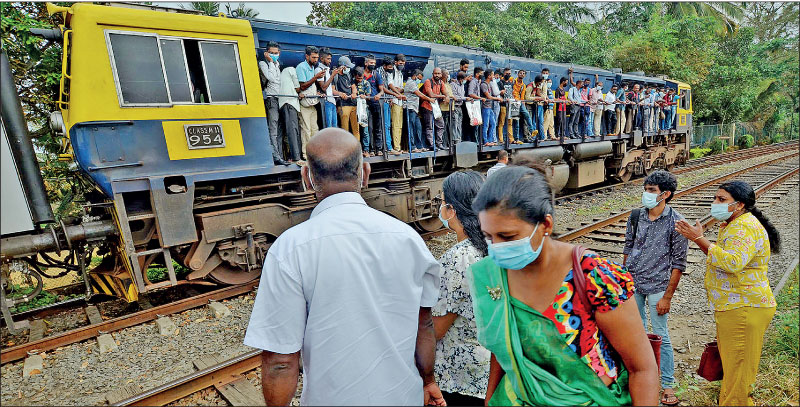Saturday Feb 21, 2026
Saturday Feb 21, 2026
Friday, 8 July 2022 02:35 - - {{hitsCtrl.values.hits}}

It’s one thing to be a failed state. Another to begrudgingly allow to be governed by the same corrupt foolhardy leaders. But it’s a whole different ball game when a country is riddled with long-term scars – Pic by Shehan Gunasekara
 Let’s all agree on this premise. Well, at this point it’s no longer just a premise; it’s a full-blown set of dire situations that has led to a sequence of failures. Triggered by domino-effects that have resulted in sector-wide meltdowns, has sucked the oxygen out of the country’s wellbeing. Sri Lanka, for all formal and informal purposes, is a failed state. (Just for my benefit, I asked Google what a ‘failed state’ was. And the search result I got was: ‘a state whose political or economic system has become so weak that the government is no longer in control’).
Let’s all agree on this premise. Well, at this point it’s no longer just a premise; it’s a full-blown set of dire situations that has led to a sequence of failures. Triggered by domino-effects that have resulted in sector-wide meltdowns, has sucked the oxygen out of the country’s wellbeing. Sri Lanka, for all formal and informal purposes, is a failed state. (Just for my benefit, I asked Google what a ‘failed state’ was. And the search result I got was: ‘a state whose political or economic system has become so weak that the government is no longer in control’).
Well, if anybody wants to argue and make a case that such a statement would only apply to, say, a country like Syria or Libya, but not Sri Lanka, and that we are miles away from being that (i.e., a failed state), then for one, you are truly optimistic, but two, ground reality suggests otherwise!
Therefore…as we’ve established that Sri Lanka has failed its populace, systems, and all other important functions, let’s address the topic chosen for this piece. On the internet and on YouTube, you will find plenty of motivational pieces and TED Talks that dissect how ‘failure is contagious,’ however, through adversity and bitter loss, people then become victorious and slay a few dragons, goliaths and a Smaug, for good measure on their way to victory.
TED talks can be self-indulging and effusive at the same time, but they can also add perspective, when looked at a problem from a specific point of view. The key takeaway here is that almost all these systemic countrywide failures are at a scale that affects an entire 65,000 sq. km land of ~22 million people.
So now that all of this has been properly laid out, let’s really focus on the matter at hand. What are the long-term effects and consequences of a failed state, leading up to a (potentially) decade-long wait to crawl out of an economic and social abyss – from the perspective of an entire population’s mental wellbeing? Every action has a consequence. For every inch we retreat, every ounce of momentum we lose, every rupee we torch from our diminishing savings, we move further and further away from the rest of the world.
For starters, imagine being a school-going youngling in this current context! Go back to circa March 2020 – yes, the pandemic began, and everything shutdown. But that was a once in a century global phenomenon that affected the entire world, so the temporary loss to a normal means of education, social interaction, and freedom to move around was never a permanent fixture in those young minds. But fast forward to mid-2022, and now look at all the issues students have faced over the past six months alone in Sri Lanka.
They have faced multiple school closures, exam date changes, lack of paper to print exam papers, and disruptions to their daily and weekly schooling schedules. All of that because of a new COVID variant that rampaged through the country – none, zero.
We have entered a truly dark passage of time for Sri Lanka. That itself is a gross understatement. Everything we used to do, that was part of our normal daily lives, has turned on its head and has changed – some maybe forever. The country’s population hasn’t seen a steady supply of LPG cylinders for many moons now. Petrol, diesel and kerosene queues are endless; what started off as multiple hours-long fuel waits, quickly morphed into multiple days of waits, and now we are at a ‘the government no longer has petrol and diesel to distribute, so don’t queue up’ stage. Rolling blackouts have become so normal, and part of the current zeitgeist, where people move everything around just to fit their lives into that. Mind you, we are in 2022.
Now where is all of this leading up to? Or leading us to? Something’s gotta give, right? The enduring law of nature is that it always seeks balance, or equilibrium. So, for that to happen, we as a populace are made to make hard sacrifices. We are sacrificing our children’s education, freedom to enjoy themselves, learn to make social connections, and have replaced their time to enjoy one’s unencumbered young spirits with sporadic blackouts, doused with mental fatigue that will leave lasting residual effects on them as they grow into adolescence and into adulthood.
Young adults will find their careers being curtailed, their earning capacity being curbed, not being able to wed on time, unable to afford an automobile, a house, support a family, take care of their elderly parents, etc. People in their middle ages will struggle to keep up with their family expenses, rents, mortgage payments, loan payments, credit card payments – leading to defaults and loss of property. And not being able to finance their children’s education had they planned to send them to a foreign country. Elderly parents will find it impossible to put together and finance their child’s wedding or help them out with the purchase of a house, or more importantly, have enough money saved up for themselves for their own retirement.
It is a vicious circle of life, in the most self-destructive and unpleasant way imaginable that will affect many Sri Lankans for a decade or more to come. Are we even remotely ready to accept the mental scars, anxiety, depression, and thoughts of suicide that will glacially move over and mummify most of us over the next few years, regardless of our age or gender? No, we are not ready. And neither are we cognisant about the mass-scale damage it will cause upon an entire population.
As a conservative group of people, we Sri Lankans are masters at bottling up our fears, frustrations and mental anxieties for ourselves. But now, with what we are traversing through as an entire populace, can we all afford to bottle it up and continue to swallow it? What will happen when it all starts to come out, sporadically first, in clusters next, and later as a flood of broken-down humanity? Are we ready for that? Is our healthcare system ready for it?
It’s one thing to be a failed state. Another to begrudgingly allow to be governed by the same corrupt foolhardy leaders. But it’s a whole different ball game when a country is riddled with long-term scars of anxiety, depression, and mental trauma stemming from what we have been made to go through over the past several months.
What kind of a reckoning awaits Sri Lankans over the next few months and years?